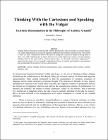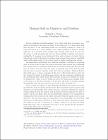Browsing Philosophy by Title
Now showing items 113-132 of 151
-
Seeking Spinoza: The Spinozistic Origins of Early Psychological Theory in Wundt, James and Freud
(Trinity College Dublin. School of Social Sciences & Philosophy. Discipline of Philosophy, 2019)This thesis investigates the previously unexamined convergence between Spinoza's monistic philosophy of psychology and early psychological theory. It argues that the three 'founding fathers' of the field of psychology, ... -
Self-Ownership and the Duty to Assist
(2022)Libertarians are attracted to the self-ownership thesis because it seems to satisfy four important theoretical desiderata. First, the thesis treats all persons equally by assigning them the same initial set of rights. ... -
Shameless luck egalitarians
(2022)A recurring concern about luck egalitarianism is that its implementation would make some individuals, in particular those who lack marketable talents, experience shame. This, the objection goes, undermines individuals’ ... -
A Short Glossary of Metaphysics
(Routledge, 2009)NOTE: Many of the words in this glossary have everyday meanings which are different from these. We give only the more specialized philosophical meanings. JOHNSONIAN HEALTH WARNING: like all glossaries and dictionaries, ... -
Simple Bodies and Aristotle's Explanation of Change: De Caelo and De Generatione et Corruptione
(Trinity College Dublin. School of Social Sciences & Philosophy. Discipline of Philosophy, 2021)Why does Aristotle commit to the existence of simple bodies? Why does Aristotle conduct an investigation into simple bodies as part of his his natural philosophy? These are the two questions I want to focus on in this ... -
State rights as group rights: an analytical perspective
(Routledge, 2014) -
The Structure of Forms in Plato's Theory of Forms
(Trinity College Dublin. School of Social Sciences & Philosophy. Discipline of Philosophy, 2023)The overall aim of this PhD dissertation is to consider and examine the relations between Forms in Plato?s theory of Forms. Undertaking this task does not require a full account of Plato?s theory of Forms, rather it requires ... -
Substantial priority : an essay in fundamental mereology
(Trinity College (Dublin, Ireland). Philosophy Department, 2013)Philosophical inquiry concerning the relationship between wholes and their parts (mereology) has occupied center stage in some of the most fruitful periods in the Western philosophical tradition. With the recent resurgence ... -
Supernumeration: Vagueness and Numbers
(Oxford University Press, 2010)After reviewing the principal and well-known defects of fuzzy logic this paper proposes to use numerical values in conjunction with a supervaluational approach to vagueness. The two principal ideas are degrees of candidature ... -
The argumentative unity of Plato's Parmenides
(Trinity College (Dublin, Ireland). Philosophy Department, 2014)The purpose of this thesis is to make the case that Plato's dialogue Parmenides constitutes an argumentative unity whereby certain philosophic difficulties presented in the first part of the dialogue are resolved by the ... -
The metaphysics of 18th century natural religion
(Trinity College (Dublin, Ireland). Philosophy Department, 2011)The main focus of this dissertation concerns the influence that Malebranche's conception of causation, which understands causal power in terms of absolute necessity, had upon the writings of George Berkeley and David Hume, ... -
The role of Kinêsis and Statis in Plato's Sophist : an inquiry into the two forgotten Megista Genê of the Sophist
(Trinity College (Dublin, Ireland). Philosophy Department, 2017)This dissertation addresses the general question of the relation between the problem of being and the theory of the five great kinds (megista genê) in Plato’s dialogue the Sophist. In contemporary scholarship, the two ... -
The Schreber case : towards a philosophical construction of madness
(Trinity College (Dublin, Ireland). Philosophy Department, 2009)Daniel Paul Schreber, lawyer and judge, is better known as a "psychiatric patient par excellence". Schreber's case is also interesting in terms of the debate as to what constitutes health and what, disease. The three main ... -
Thinking with the Cartesians and Speaking with the Vulgar: Extrinsic Denomination in the Philosophy of Antoine Arnauld
(2022)Arnauld follows Descartes in denying that sensible qualities like color are modes of external objects. Yet, unlike Malebranche, he resists the apparent implication that ordinary statements like ‘this marble is white’ are ... -
Thomas Reid on Character and Freedom
(2012) -
Time Travel and Counterfactual Asymmetry
(2021)We standardly evaluate counterfactuals and abilities in temporally asymmetric terms—by keeping the past fixed and holding the future open. Only future events depend counterfactually on what happens now. Past events do ... -
Time, Flies, and Why We Can?t Control the Past
(Harvard University Press, 2023) -
"Tint and Form": The Geometric Philosophy Underlying Oliver Byrne's Elements
(2022)Oliver Byrne published his ground-breaking and visually remarkable edition of Euclid’s Elements in 1847. The book is extraordinary: its pages are adorned with generous four-colour diagrams, illustrations and grids, and ... -
Twardowski on Truth
(The Baltic International Yearbook of Cognition, Logic and Communication, 2009)Of those students of Franz Brentano who went on to become professional philosophers, Kazimierz Twardowski (1866-1938) is much less well-known than his older contemporaries Edmund Husserl and Alexius Meinong. Yet in terms ... -
Understanding Omnipotence
(2012)

















